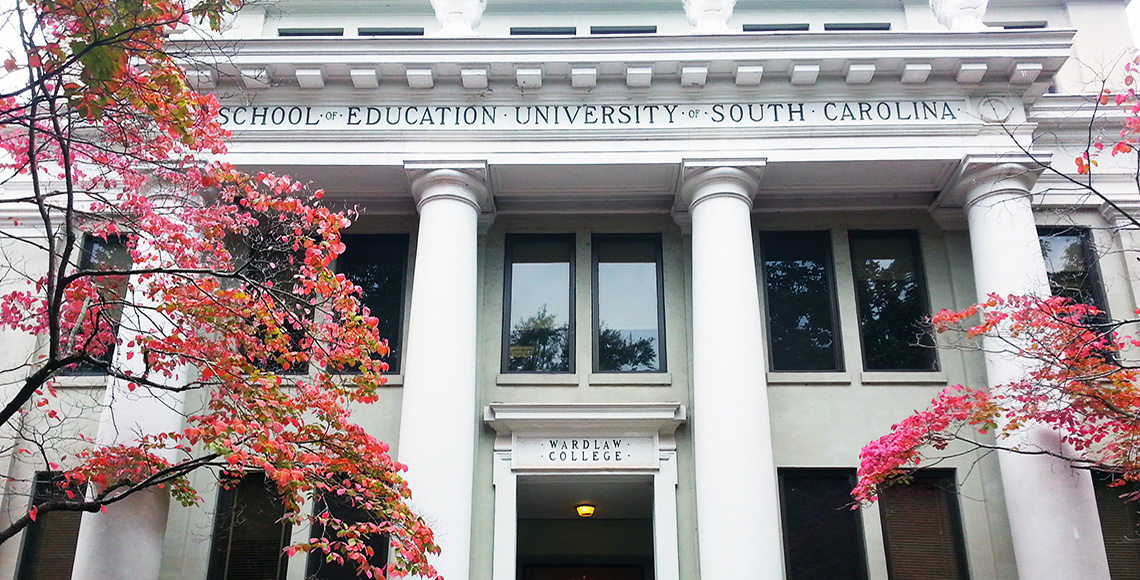Collaborative Educational Leader (All Programs)
There are four dispositions vital to the Collaborative Educational Leader:
- Integrity through which one’s actions are ethical, open, and forthright
- Intellectual Spirit that undergirds the responsibility of professional educators to construct, generate, and share knowledge while maintaining perspectives on the contexts of learning
- Justice for all people, appreciation for and recognition of the significance of diversity, and a dedication to democratic principles (including individual rights and responsibilities for the greater good)
- Stewardship that guides teaching, counseling, and leading; recognizes the central roles of collaboration and professional responsibility; and requires initiative in identifying and acting on needs with thoughtful and professional care
The knowledge of USC’s Collaborative Educational Leader is defined in five areas:
- Content including a broad general education in the Arts and Sciences and an in-depth understanding of the areas in which each professional educator will practice
- Diversity that encompasses a critical examination of educational issues in relation to individual and group similarities and differences (e.g., gender, culture, race, exceptionalities, viewpoints)
- Human Growth and Development (physical, social, emotional, and cognitive) as a foundation for analyzing and understanding behavior and making appropriate professional decisions
- Standards and recommendations for practice from professional associations, national and state guidelines, and legal perspectives with the knowledge necessary to assess these standards in the societal context
- Theory and Research of pedagogy, curriculum, and assessment in the areas in which each professional educator will practice
The Collaborative Educational Leader supports best practice, innovation, and change through four key behaviors:
- Communicating effectively as a member and leader of a community of learners through oral, written, and non-verbal means; reflective listening; appropriate and current technologies; and other modes of expression appropriate to his/her discipline
- Facilitating Learning by effectively designing and maintaining physical and affective environments, implementing plans, adjusting strategies, and managing people, activities, technology, and resources in partnership with others (e.g., colleagues, parents, students, community members) in ways consistent with professional and state standards, theory and research in the field, and demonstrating leadership within the appropriate professional context (e.g., classroom, school, district, college, state, nation)
- Engaging in Inquiry and reflection to further personal knowledge while contributing to and promoting the knowledge of the profession at levels appropriate to his/her work (local, state, national, international)
- Decision-Making through which one leads educational progress by planning appropriate goals, environments, actions, and assessment strategies based on in-depth professional knowledge, collaboration with other stakeholders, and the systematic collection and analysis of appropriate data (e.g., characteristics, needs, and abilities of learners; educational, environmental, and community contexts; perspectives of multiple stakeholders)
Collaborative Educational Leader and Advocate (Advanced Programs)
Candidates in USC’s advanced programs possess all the qualities of a Collaborative Educational Leader described above at levels appropriate to their advanced degrees. For example, M.Ed./Ed.S. candidates move beyond sharing inquiry within their immediate school community to impact district and state levels. Doctoral candidates meet standards for peer review in refereed publications and national presentations. Advanced candidates possess a deep understanding of professional knowledge and demonstrate refined practice. In addition, advanced candidates’ operate beyond their immediate sphere of influence to fulfill the following advanced practice dimension:
- Advocating for education with and through a variety of constituencies (e.g., parents, legislators, business community, professional association colleagues) and in support of innovation and change in response to the needs of students, the profession, the community and the greater society
